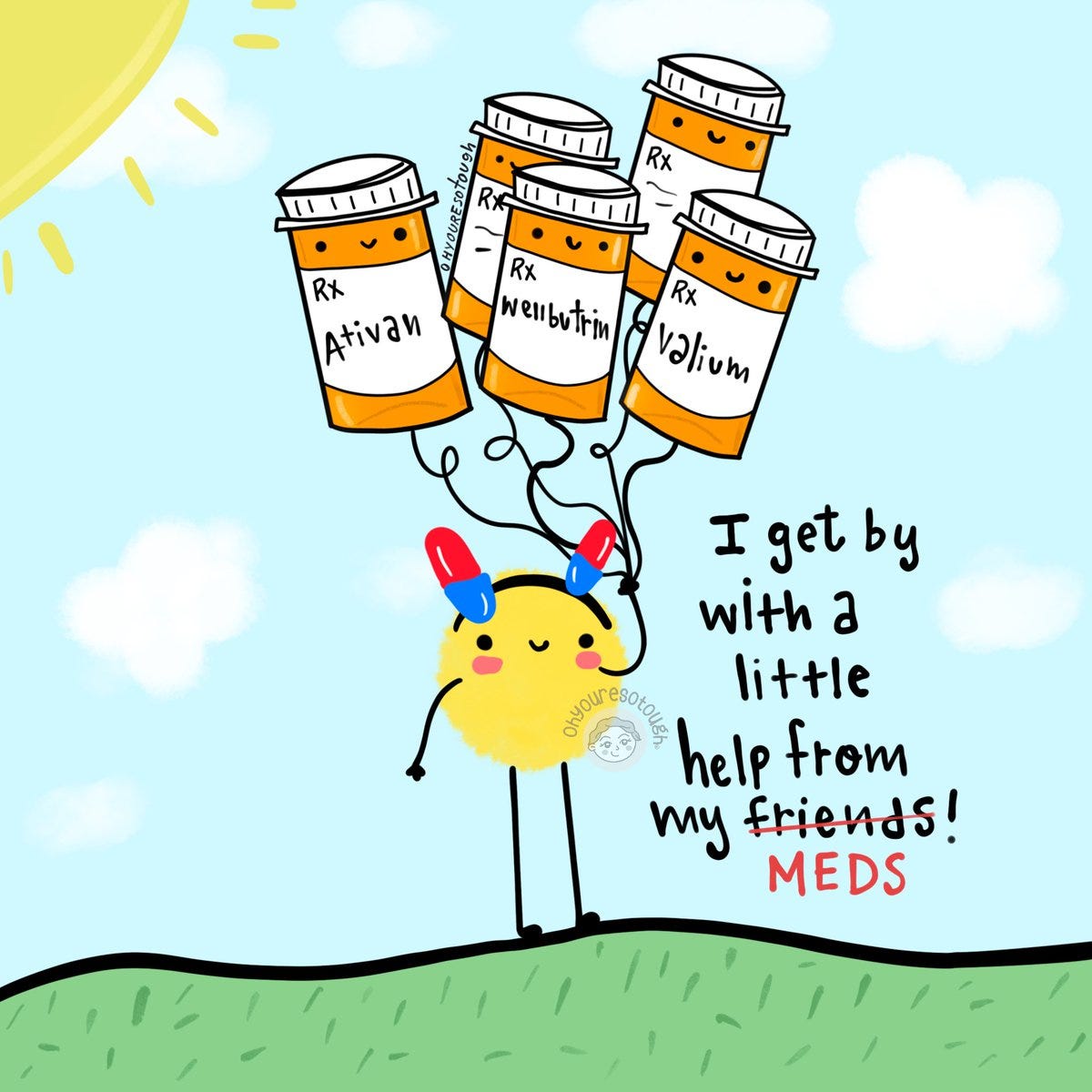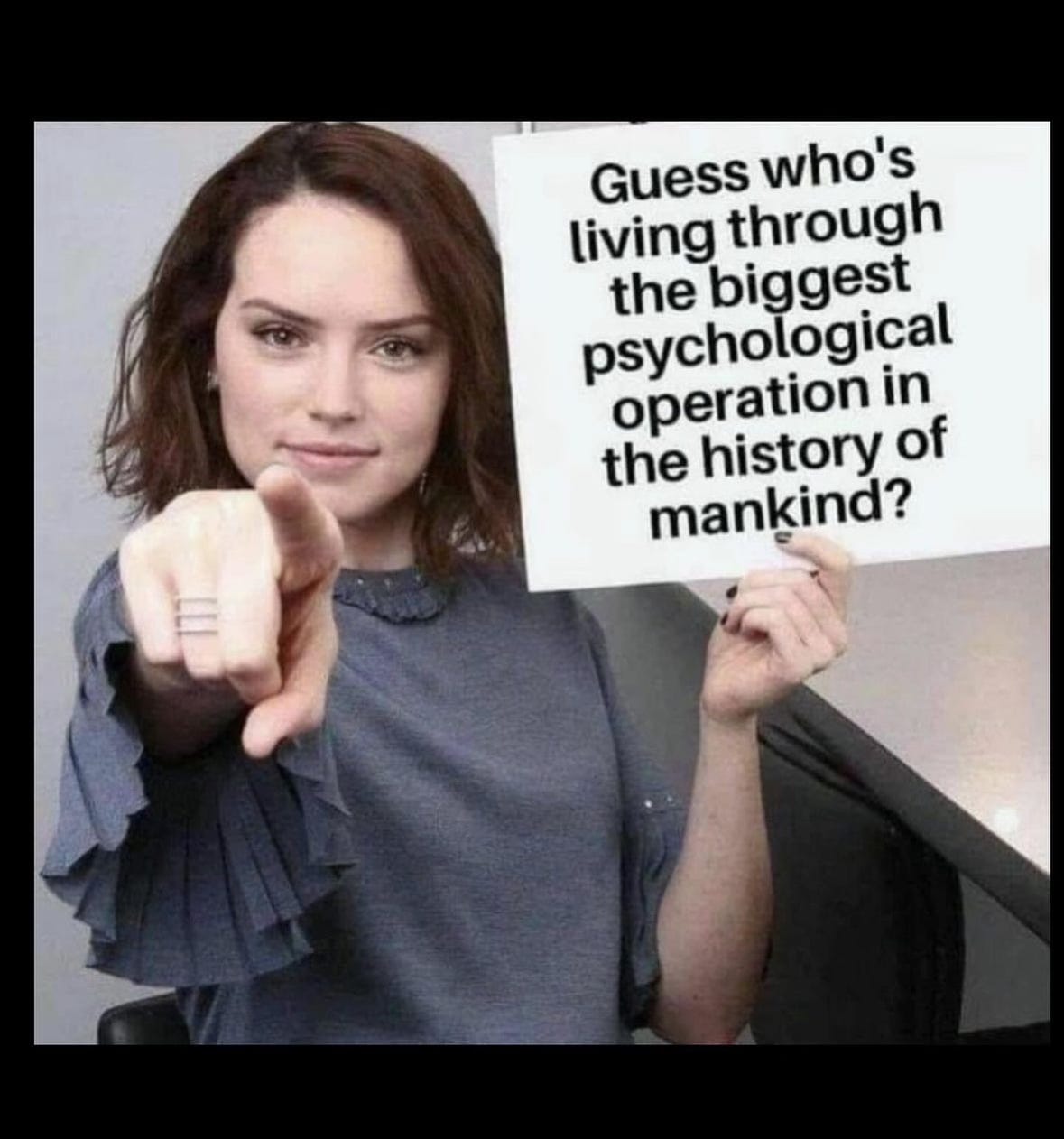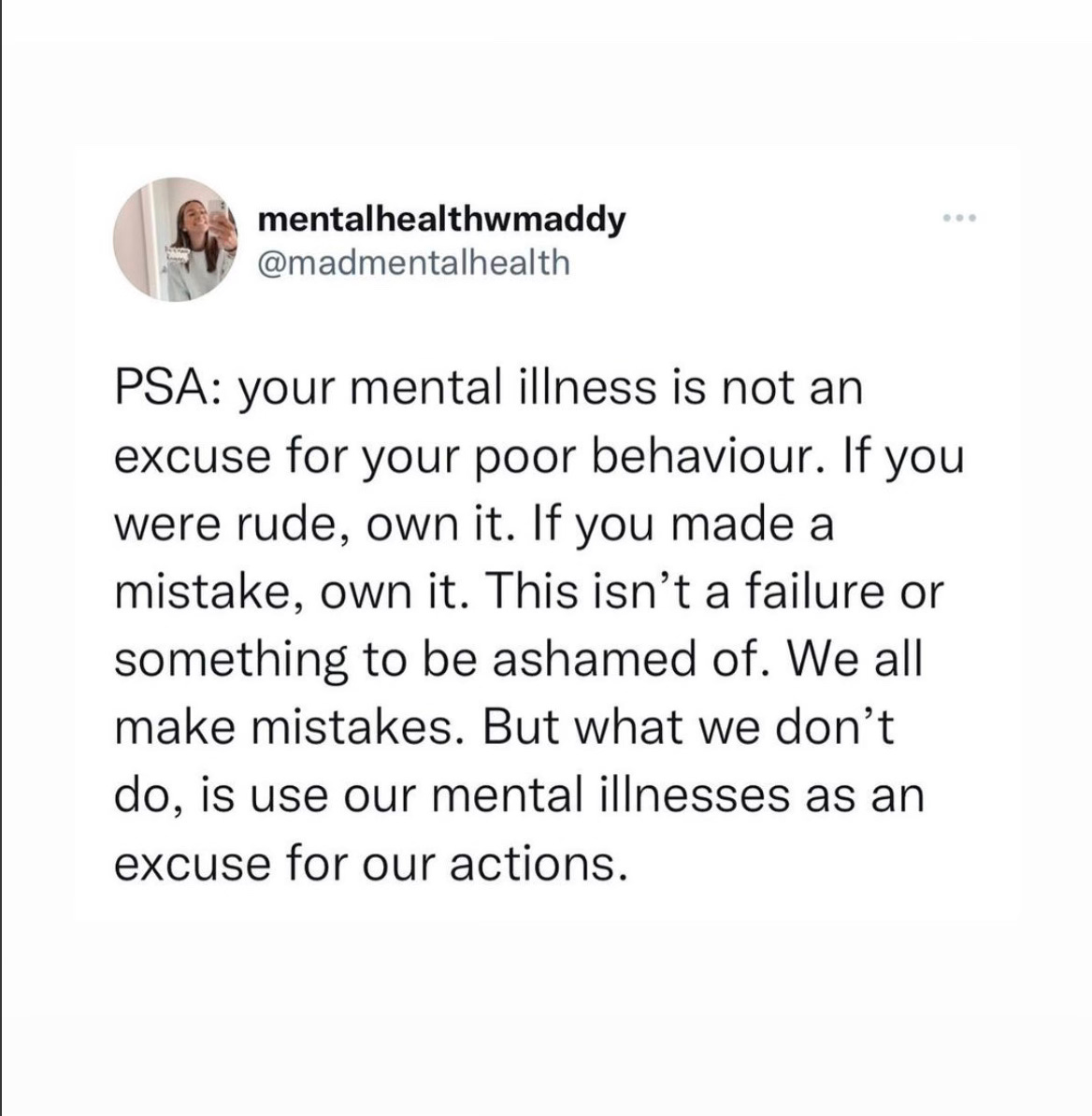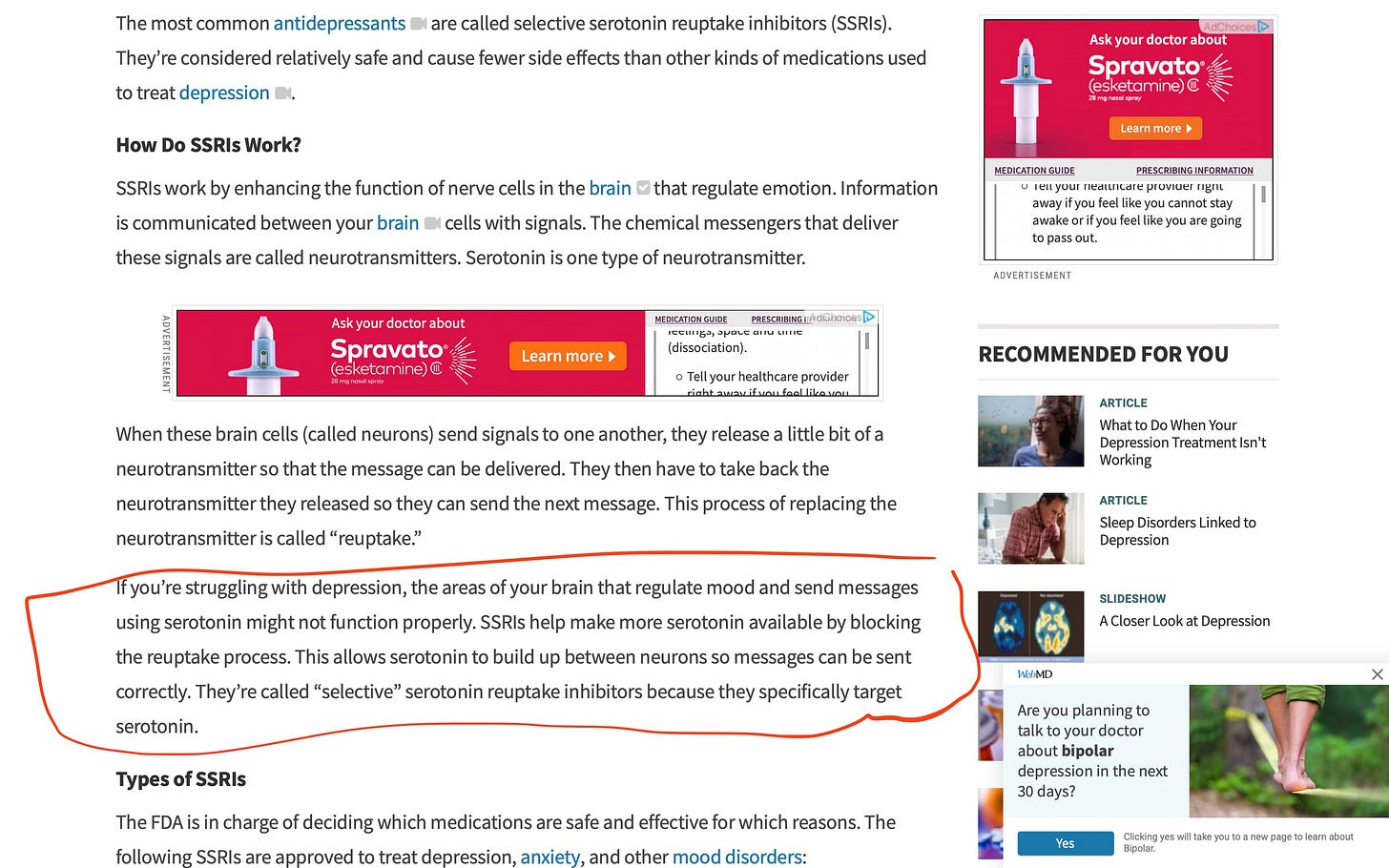It's Not My Fault... Its My "Mental Illness"
The PsyOp on western societies that changed everything
Photo credit: Chelsey Gomez- Posted on X 12/9/23
"Only your doctor can diagnose depression."
Six words. Six innocent-sounding words that have unleashed a pandemic of helplessness across the Western world.
This isn't just a disclaimer on an antidepressant ad. It's the lynchpin of a multi-billion dollar psyop that's rewired the collective psyche of entire nations. It's a precision-guided missile, launched from Big Pharma's marketing war room, that's obliterated our trust in our own minds. It’s now widely applied to… well you name the mental illness-Bipolar Disorder, ADHD, Depression, and even “My Autism”.
Think about it.
In just one generation, we've gone from a society that weathered life's storms with grit and community to one that runs to the doctor for every mood swing. We've traded resilience for prescriptions, self-reliance for "self-care" products, and the rich tapestry of human emotion for a chemical flatline of medicated contentment.
This isn't progress. It's a hijacking of the human spirit, gift-wrapped in the language of medical concern.
And it all hinges on that one insidious idea: that you—yes, you—are not qualified to understand your own mind. That your sadness, your grief, your anger at a world gone mad are symptoms to be diagnosed rather than valid human responses to be felt and processed.
Welcome to the greatest mindfuck in medical history. Strap in, because we're about to unravel how a single phrase became the trojan horse that turned nations into a docile army of patients.
When 'Educated Guesswork' Becomes a “Mental Illness”
Before we dive into the murky waters of personal responsibility, let's address the elephant in the examination room: the precarious position we've placed our medical professionals in. We've transformed doctors from healers into soothsayers, tasked with diagnosing conditions that can neither be observed under a microscope nor detected by any lab test.
In fact… it’s usually done in less than 10 minutes.
Hold on a moment... We're told that only a doctor can diagnose depression, yet the entire basis for this supposedly scientific diagnosis rests solely on what the patient chooses to disclose? Doesn't this strike you as a glaring contradiction?
It's akin to asking a mechanic to fix your car blindfolded, using only the sounds you make while imitating the engine.
"Only a doctor can diagnose depression," we're told.
But let's be clear - this isn't like diagnosing strep throat or a broken bone. There's no depression swab, no mood X-ray. Instead, we're asking doctors to interpret the complexity of human emotions through the narrow lens of a symptom checklist. One that is self reported nonetheless!
No concerns with the validity of self report?
This diagnostic dilemma spawns a Pandora's box of far-reaching consequences. In the absence of objective tests, psychiatric diagnoses become a high-stakes game of interpretive dance, where the steps are improvised and the music is in the doctor's head. Two patients could waltz into the same office with identical symptoms, only to cha-cha out with wildly different diagnoses, courtesy of the doctor's mood, experience, or what they had for breakfast that morning. It's less empirical science and more psychiatric Rorschach test, where "What do you see?" could mean the difference between a clean bill of health and a lifetime prescription.
Adding to this diagnostic disco, we must contend with the treacherous terrain of language and self-expression. The human experience of emotion is as varied as there are stars in the sky, yet we're asked to cram these infinite hues into the crayon box of psychiatric labels.
One person's "feeling blue" might be another's "crippling depression," while "a bit nervous" could run the gamut from mild jitters to full-blown panic attacks. Factor in varying levels of emotional intelligence, vocabulary, and self-awareness, and you've got a Tower of Babel situation where patient and doctor might as well be speaking different languages. In this linguistic labyrinth, is it any wonder that diagnoses often feel more like shots in the dark than precise medical determinations?
"Only a doctor can diagnose depression." Let that sink in. No doctor, no diagnosis—and suddenly, your lived experience vanishes into thin air. Poof! No medical degree, no depression. Absurd, isn't it?
By positioning doctors as the sole arbiters of mental health, we create an artificial aura of infallibility around their diagnoses. This not only puts undue pressure on physicians but also disempowers individuals from trusting their own experiences and insights.
As the Diagnostic and Statistical Manual of Mental Disorders (DSM) grows thicker with each edition, the threshold for what constitutes a "disorder" gets lower. Suddenly, doctors find themselves in the position of pathologizing normal human experiences. Grief becomes "prolonged grief disorder," and the ups and downs of life morph into "mood dysregulation."
If you've made it this far, you're probably fighting the urge to self-diagnose with Chronic Eye-Roll Syndrome. (Don't worry, there's likely a pill for that too.)
Let's appreciate the absurdity: we've created a world where every quirk is a disorder and every life challenge requires pharmaceutical intervention. Picture it: humans, who survived ice ages and invented space travel, now paralyzed by awkward small talk without mood stabilizers. It's a cosmic comedy sketch where the punchline is always, "Ask your doctor about..."
But here's where our tragicomedy takes a sinister turn.
What if this isn't just a series of well-intentioned missteps? What if this medicalization merry-go-round is operating exactly as designed? Each new label creates a new market. Each self-diagnosis leads to more prescriptions. It's a self-perpetuating cycle that would make any business mogul green with envy.
The cherry on top? A population reliant on external validation and chemical regulation is arguably easier to manage and control. It's enough to make you paranoid—but careful, that might be a symptom of something.
Let's cut to the chase: "Only a doctor can diagnose depression" isn't just a harmless medical maxim—it's a calculated ploy, and it's working exactly as intended. This seemingly innocuous phrase is the lynchpin in a grand design to medicalize the human condition and erase personal accountability. And make no mistake, it's deliberate. We're not stumbling into this reality; we're being ushered into it.
Look around. We've engineered a society where every emotional ripple is a disorder, every life challenge a clinical symptom. Coincidence? Hardly. This is social engineering at its finest—or its most insidious, depending on your perspective.
The endgame? A docile, medicated population where nothing is anyone's fault anymore. Where consequences are rebranded as symptoms, and mental illness is the universal scapegoat. It's not just convenient; it's purposeful. A diagnosed, drugged populace doesn't revolt—it schedules another appointment.
This isn't about health—it's about control. The question isn't whether this system is broken; it's whether it's functioning exactly as designed. And as our capacity for dissent is quietly medicated away, the answer becomes chillingly clear.
The Death of Personal Responsibility
Welcome to the brave new world where "It's not my fault, it's my mental illness" has become the ultimate get-out-of-jail-free card.
Consider the case of an employee who consistently fails to meet deadlines. In previous decades, such an individual might have been compelled to examine their work habits, seek productivity strategies, or simply increase their effort to meet job requirements. However, in today's medical landscape, this same employee is more likely to receive a diagnosis of som Executive Function Disorder like ADHD.
Relationship problems are no longer opportunities for self-reflection and growth, but symptoms of Attachment Disorder. Impulsive spending isn't a lack of financial discipline; it's Compulsive Buying Disorder. Even infidelity can be conveniently repackaged as sex addiction, neatly sidestepping the thorny issues of trust, commitment, and personal choice.
The rise of the armchair psychiatrist compounds this issue. Armed with WebMD and a penchant for self-diagnosis, individuals are quick to label themselves with conditions they may or may not have, further muddying the waters of accountability. It's a peculiar world indeed where "I'm not lazy, I'm just serotonin challenged" passes for a valid excuse. Look WebMD says I my serotonin might not function properly!
In recent years, a troubling pattern has emerged in marital and relationship dynamics. There's a growing tendency for individuals to retrospectively attribute infidelity to purported "manic episodes," even when their experiences do not align with the clinical definition of mania.
This phenomenon reflects a broader trend of medicalizing personal choices and moral dilemmas. In multiple cases, I've observed partners who engaged in extramarital affairs subsequently adopting the language of mental illness, describing their indiscretions as symptoms rather than decisions.
They often proceed to seek psychiatric treatment, framing it as a necessary step to salvage their marriages. While genuine bipolar disorder can indeed impact behavior, this rush to diagnose oneself post-infidelity raises concerns about the misuse of psychiatric labels as a means of deflecting personal responsibility.
The death of personal responsibility isn't just a philosophical concern—it's a societal crisis in the making. But perhaps the most tragic consequence of this trend is the opportunity cost. In our rush to medicalize every aspect of the human experience, we rob ourselves and our society of the growth that comes from facing our flaws head-on. We trade the hard-won wisdom of personal reflection and the satisfaction of self-improvement for the cold comfort of a diagnostic label and a prescription.
The consequences of this mass abdication of responsibility are as profound as they are insidious. We're witnessing the emergence of a society increasingly incapable of facing its own shortcomings, forever looking outward for explanations and interventions rather than inward for solutions. This isn't just navel-gazing; it's a fundamental restructuring of how we view human agency and personal growth.
More alarmingly, by relinquishing personal responsibility, we're effectively amputating our capacity for meaningful development. Without the catalyst of accountability, our potential for growth withers, leaving us in a state of perpetual psychological and moral adolescence.
We're creating a culture of stagnation, where individuals remain trapped in cycles of blame and victimhood, never fully maturing into the resilient, self-actualized beings they could become. This stunted development doesn't just affect individuals—it ripples through society, eroding the very foundations of progress and collective evolution.
But make no mistake: this trend is robbing us blind, stealing away the very experiences that forge resilience, build character, and fuel personal evolution. Every time we rush to pathologize a normal human emotion or experience, we deny ourselves the opportunity to learn, adapt, and grow stronger. We're trading the gym of life for the waiting room of imagined illness.
A small percentage of billionaires couldn't be more pleased with the current state of affairs. For this elite few, a population that's apathetic, emotionally stunted, dependent on their products, and easily manipulated isn't a unfortunate side effect—it's the ideal scenario.
These individuals benefit immensely from a society where personal responsibility is outsourced, where emotional reactions are dulled, and where the solution to every problem comes in a bottle or a package they happen to sell. The more we rely on diagnoses and prescriptions to navigate life's challenges, the more profitable and controllable we become.
Who would have thought that six simple words—"Only your doctor can diagnose depression"—could reshape society, redefine personal responsibility, and potentially serve as a lynchpin for mass control?
In a world all too eager to label us as broken, taking ownership of our lives—flaws, failures, and all—might just be the most radical act of healing we can perform.
Your mind is your own.
Guard it fiercely.









Don't forget about what they are doing with children and teens. They are being taught to label all the big, normal emotions of childhood and the upheavals of adolescence as "depression," "anxiety," and "PTSD" and then told these conditions are lifelong, something you never recover from. Even worse, they are doing this to kids during the most vulnerable stages of identity development. It's like when the tobacco companies targeted kids in their advertisements so they could hook them young and have lifelong customers.
BAM. Your descriptive language elevated me to a new level this morning!
So revealing on why the mental health topic has exploded in the last 4 years and not in a good way. Now many claim it as cover for transgressions.
Kudos on writing so effectively!